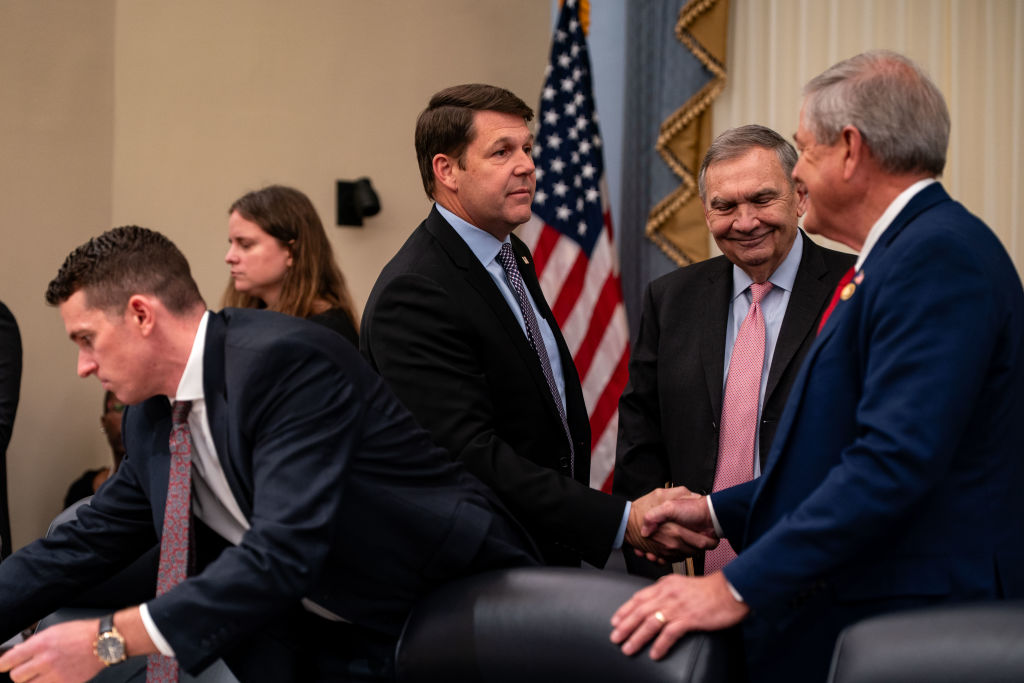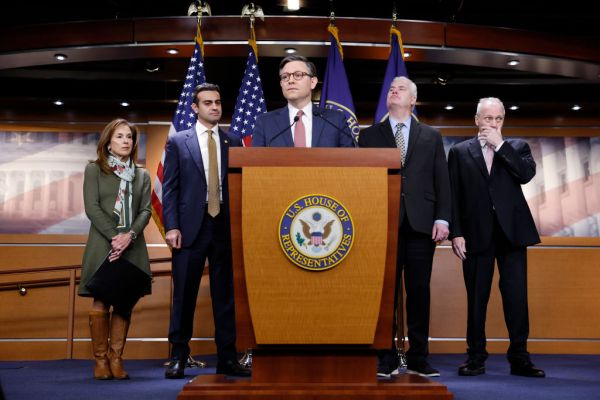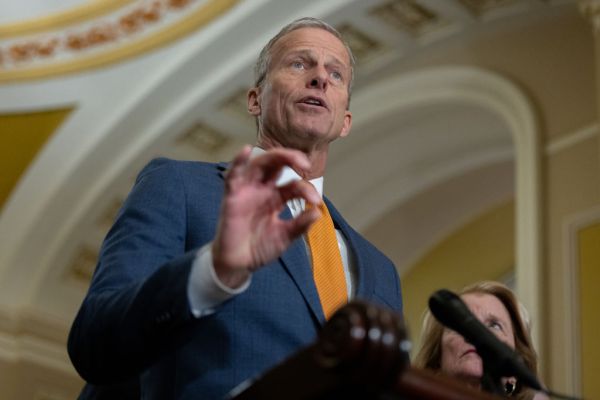After a swift kick in the pants from the Senate, Republicans in the House of Representatives sounded a rare harmonious note in voting to advance a budget resolution with tax and spending cuts, uniting leadership and fiscal hawks.
But the House’s resolution to push Donald Trump’s agenda through the budget reconciliation process—by which Congress can pass fiscal legislation with a simple majority in the Senate—did not come together easily. Nor will the harmony be permanent.
House Republicans felt a new urgency to get their process in motion when their colleagues in the Senate, tired of the House’s delays, decided last week to forge their own strategy to enact budget legislation. After lawmakers returned to session this week, House Republican leadership released its draft resolution that called for seven committees to produce a minimum of $1.5 trillion in spending cuts, with the goal of $2 trillion, while allowing the Committee on Ways and Means $4.5 trillion to put in place tax cuts. It also included an increase in the statutory debt limit by $4 trillion.
After a markup that stretched to about 10 p.m. Thursday, the House Budget Committee voted to advance the resolution, with chair Jodey Arrington of Texas calling it “a blueprint to right-size the bloated federal bureaucracy.”
The markup included an amendment that could cap the size of the tax cuts if sufficient spending cuts aren’t made. That could be a problem for Rep. Jason Smith, who chairs Ways and Means. He reportedly said Tuesday that he needs at least $4.7 trillion to extend the cuts from the 2017 Tax Cuts and Jobs Act (TCJA), most of which are set to expire after 2025, for the next 10 years. But Arrington argued that the cushion the resolution gave Smith was enough to get the job done.
“With the $4.5 [trillion], I have assurances from the administration that [Trump] can do the full TCJA 10 years, and then it would be considered for permanency in the Senate,” he told reporters.
Smith is just one of many people, though, who had concerns about the resolution. House Speaker Mike Johnson and other GOP House leaders also needed to placate members of the House Freedom Caucus, ever insistent upon cutting spending. South Carolina Rep. Ralph Norman, a Freedom Caucus member who sits on the Budget Committee, called for a stronger enforcement mechanism to achieve the minimum spending cuts.
He told reporters he needed “some assurances in the language: What happens if they don't meet the [$1.5 trillion] cuts? What happens if some committees in the resolutions do not fulfill their promises?”
With those tensions, the resolution’s fate was uncertain until Rep. Andy Harris, chairman of the Freedom Caucus, announced Thursday morning that his faction had secured a deal with leadership. The committee passed an amendment that would cap the cost of the tax cuts at $4 trillion and increase that ceiling by as much money as congressional committees can cut above the original $1.5 trillion target.
“This is it. We declare victory,” Harris told The Hill after he struck the deal. “I mean, we have a bill that we believe that it had to be done rapidly to get the president the border funding as soon as possible. We believe it had that meaningful deficit reduction, and we believe it had to be able to advance the president's tax policy. It all happens here.”
With the committee adopting that amendment, its members voted to advance the resolution to the floor. It’s unclear when precisely the House will vote on it, as it is out of session this week.
Harris may have declared victory, but the hard part is still ahead. Republicans will have to decide exactly what to cut, not an easy task given competing factions, pet initiatives, and state priorities. Moderate GOP members will be looking at how the committees achieve the cuts they need.
“If a bill is put in front of me that guts the benefits my neighbors rely on, I will not vote for it,” freshman Rep. Rob Bresnahan tweeted Friday. “Pennsylvania’s Eighth District chose me to advocate for them in Congress. These benefits are promises that were made to the people of [northeastern Pennsylvania] and where I come from, people keep their word.”
Even if Republicans can hammer out the massive bill that will result from these deliberations and get it through the House—far from a guarantee—they will still need to push it through the Senate. And the upper chamber’s tax instructions issued this week will make that difficult. Nine Republicans on the Senate Finance Committee, including Majority Leader John Thune, sent a letter to Trump, Johnson, and Smith, alerting them that anything short of making the 2017 tax cuts permanent will die in the Senate.
“A temporary extension of these pro-growth and pro-family policies is a missed opportunity,” the group wrote. “Businesses need certainty while investing in their companies and taxpayers should not fear tax hikes due to Congressional inaction. Congressional Republicans have an historic opportunity to enact this lasting tax relief.”
The day before the House conducted its markup, the Senate Budget Committee passed its own resolution that includes $175 billion for border security and $150 billion, in anticipation of tackling more difficult priorities, including the tax cuts, in a subsequent bill. The Senate will continue to prepare the legislation in case the House bill encounters roadblocks.
“I respect what the House is attempting to do, but I think they’re finding that ‘one big, beautiful bill’ is also one very complicated, even difficult to draft, much less easy to pass, type of bill,” Sen. Ron Johnson of Wisconsin told The Dispatch before the House completed its markup. “So we’re called the fallback position.”







Please note that we at The Dispatch hold ourselves, our work, and our commenters to a higher standard than other places on the internet. We welcome comments that foster genuine debate or discussion—including comments critical of us or our work—but responses that include ad hominem attacks on fellow Dispatch members or are intended to stoke fear and anger may be moderated.
With your membership, you only have the ability to comment on The Morning Dispatch articles. Consider upgrading to join the conversation everywhere.